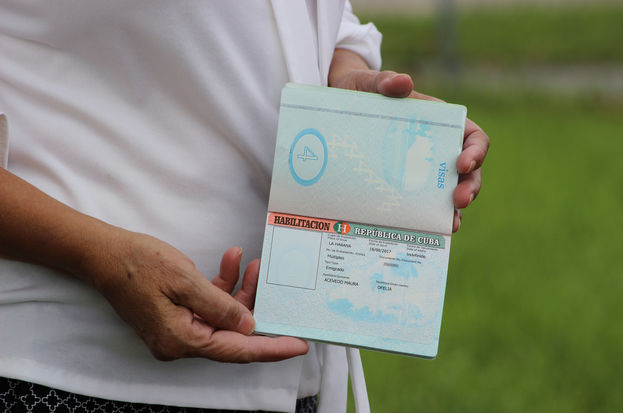Our apologies for the lack of subtitles on this video.
![]() 14ymedio, Mario Penton, Miami, 28 October 2017 – On Thursday, after four years of exile, Ofelia Acevedo, widow of Oswaldo Payá, the deceased opponent of the Cuban regime, was not allowed to enter her own country. Acevedo, an activist in her own right, had decided to travel to Havana to clarify the circumstances of her husband’s death in 2012, after a traffic crash that the family believes was an attack planned by the authorities.
14ymedio, Mario Penton, Miami, 28 October 2017 – On Thursday, after four years of exile, Ofelia Acevedo, widow of Oswaldo Payá, the deceased opponent of the Cuban regime, was not allowed to enter her own country. Acevedo, an activist in her own right, had decided to travel to Havana to clarify the circumstances of her husband’s death in 2012, after a traffic crash that the family believes was an attack planned by the authorities.
Although the Cuban government provided her with a new passport, stamped with the special authorization that citizens who have been out of the country more than two years must have to enter Cuba, when she arrived in Havana she was refused entry to the country and forced to return to Miami from Jose Marti International Airport in Havana.
“The Cuban State will not let me enter my country. Despite having my papers in order and meeting the legal terms, I was forced to return [to the United States] on Thursday without even an explanation of why I can not return,” says Acevedo, who spoke with 14ymedio at her home in Miami.
“I wanted to get the autopsy reports for Oswaldo [Payá] and Harold [Cepero, who died in the same crash], because when I was in Cuba I filled out endless paperwork and they never gave them to me,” she explained.
“Upon arriving at the immigration barriers, an officer told me that the system showed a restriction order, so that I could not enter the country. I told him that I would not move from there until they explained to me why I could not return to my own land,” she says.
Acevedo tells how a nervous Customs official asked her to follow his directions. “I’m just doing my job. You must have a job and surely you do it,” he repeated.
In the face her demands, Major Ángel Hernández Báez, the person in charge of immigration, appeared and informed her that his function was “to execute the action” of not letting her enter. “My sole function is to keep you from entering the country,” he stressed to Acevedo.

For hours, Payá’s widow, in the company of her daughter Rosa María Payá, leader of the CubaDecides citizens’ initiative, debated with the official until finally Hernández Báez explained that the return flight was about to leave and that she would definitely not enter the national territory. The officer gave the airline a withdrawal order, but Acevedo was never given an explanation of the refusal.
After the crash that cost her husband and the young activist Harold Cepero their lives, the widow reports that she tried to obtain the report of the autoposy, but that the authorities never allowed it.
“After having taken so many steps and going to so many places the hospital director told me that he would send it to me in the mail, which he never did. I complained several times to the hospital but they never answered me,” she says.
The family has a right to the autopsy report, she asserts. From letters to the Minister of Public Health, Roberto Morales Ojeda, to an accusation presented to the Ministry of Justice, she took every possible action to seek to shed light on the fateful event.
Oswaldo Payá Sardiñas (1952-2012) was a charismatic leader, president of the Catholic-inspired Christian Liberation Movement, which organized the Varela Project in 1998, collecting more than 20,000 signatures to demand political reforms from the government then presided over by Fidel Castro.
The Constitution allows the organization of a national referendum for any proposal signed by a minimum of 10,000 citizens. However, the National Assembly of Peoples Power, under the absolute control of the Communist Party, dismissed the initiative and Fidel Castro promoted the declaration of the “irrevocable” character of socialism, eliminating any attempt at political change through laws.
Payá’s widow says she will not rest until she gets all the information she deserves about her husband’s death and makes “the truth” known.
“I still demand an investigation so that we really know what happened, even with all the limitations that I have, like this one of not entering my own country,” she says.
“I fear for the life of my daughter because their [the Cuban government’s] logic is not our logic, it is evil. They have not changed anything. Rosa María has not abandoned the path traced by her father and they can’t forgive this. They hate my family a lot.”
